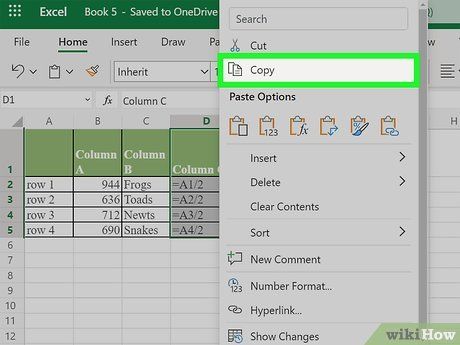3 Ways Excel Can Copy Data to Another Sheet

Microsoft Excel is a powerhouse for data manipulation and organization. Among its myriad of functions, copying data from one sheet to another is a common task that can significantly streamline your workflow. Here, we delve into three distinct methods to achieve this in Excel:
Copying Data with the Mouse

This method is intuitive and straightforward, making it perfect for quick, small-scale data transfers:
- Select the data range you wish to copy.
- Right-click on the selection, choose "Copy" or press
Ctrl+C. - Navigate to the destination sheet, select the cell where you want to start copying, then right-click and choose "Paste" or press
Ctrl+V.
Notes:

💡 Note: Use this method for small datasets. For larger datasets, consider automated methods to avoid errors.
Using Excel Functions to Reference Data

This approach allows for dynamic data updates without manually copying:
- In the destination cell, enter
=SheetName!A1where SheetName is the source sheet's name, and A1 is the starting cell. - Drag the formula down or across to fill as needed.
Here's an example of how you might set up references:
| Source Sheet (Sheet1) | Destination Sheet (Sheet2) |
|---|---|
| A1: Product 1 | A1: =Sheet1!A1 |
| B1: Sales | B1: =Sheet1!B1 |

Notes:

🚫 Note: Remember to use absolute references (A1) if you want to ensure the source cell doesn’t change when copying formulas.
Employing VBA Macro for Large Scale Data Copying

For copying large volumes of data or automating repetitive tasks, VBA (Visual Basic for Applications) is your best friend:
- Open VBA editor by pressing
Alt+F11. - Insert a new module.
- Copy the following VBA code into the module:
Sub CopyDataBetweenSheets() Dim sourceSheet As Worksheet Dim destinationSheet As Worksheet Dim sourceRange As Range Dim destinationRange As Range Set sourceSheet = ThisWorkbook.Worksheets("Sheet1") Set destinationSheet = ThisWorkbook.Worksheets("Sheet2") Set sourceRange = sourceSheet.Range("A1:Z100") ' Adjust according to your data Set destinationRange = destinationSheet.Range("A1") sourceRange.Copy destinationRange End Sub - Run the macro by pressing
F5while inside the VBA editor.
Notes:

⚠️ Note: Running macros can be dangerous if the code isn’t thoroughly vetted. Always review and understand what the macro does before executing it.
This post covers three primary ways to copy data in Excel. Whether you need a quick and easy solution or an automated process for large datasets, Excel provides a range of tools to enhance productivity:
- Mouse Copy/Paste: Best for quick, small transfers.
- Excel Functions: For dynamic referencing and updates.
- VBA Macros: Ideal for automation and efficiency when handling large data volumes.
The versatility of Excel allows you to choose the method that best suits your needs, ensuring data accuracy, minimizing errors, and saving time. By integrating these methods into your workflow, you'll not only improve your proficiency in Excel but also maximize your data management capabilities.
Can I copy data from multiple sheets at once?

+
Yes, using VBA macros or the ‘Consolidate’ function in Excel, you can consolidate data from multiple sheets into one.
What if my data source changes frequently?

+
Using Excel functions to reference data dynamically is ideal for sources that change often, allowing your destination sheet to update automatically.
How can I copy specific data with filters applied?

+
First, filter your source data, then use the “Visible Cells Only” feature (Alt+;). Copy this filtered selection and paste it into your destination sheet.
Related Terms:
- Move or Copy di Excel
- Auto copy sheet Excel
- Spreadsheet



